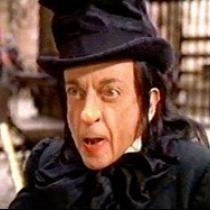I’ve been getting some strange phone calls recently. At about 6 in the evening, almost to the minute, the phone rings and I find myself talking to somebody I don’t know. It’s clearly originating from a call centre somewhere in India
What’s weird is that the operator insists on pretending that he’s got a western name. Though their English is perfect, it’s so heavily accented that I flatly refuse to believe that I’m talking to someone called, Gareth, Simon, Steven or Darren. Why are they doing it? Is Britain
“Yes, Aisha, you’ve done very well on the exam. You only got one wrong. It was a tram that killed Alan Bradley.”
I had it out with the guy who called yesterday. I stayed on the phone with him for a couple of minutes.
“Hello, Sir, my name is Patrick and I’m calling you from…”
“You’re not called Patrick.”
“Pardon?”
“You’re not called Patrick.”
“Yes I am.”
“Why did your parents call you Patrick, if you live in India
I was hoping he’d done a bit of prep and would bullshit me that his dad was a big fan of The Prisoner, but he just carried on insisting that he was really called Patrick. I know it wasn’t his fault, just obeying orders and all that, but it does demonstrate the sort of contempt that these companies have, both for us and the people who work for them.
When someone’s trying to rip me off, I prefer them to do it by good old fashioned email. I’ve been getting the 419 scam emails for years now. These are the ones that imbue me with a feeling that I’m a very important person, because the Finaunce Minster (sic) from the Ivory Coast
I often wonder how anyone working for the government in a small African country manages to get anything done these days. Can you imagine actually being the Finance Minister for the Ivory Coast
Every now and again, I reply to one of the emails, just for the crack. A whole internet community has built up around this. Just have a quick look at www.thescambaiter.com to get an idea of the lengths people go to, to take the mickey out of the scammers. It’s seizing a bit of the power back from them and the logic dictates that the longer they’re messing a scammer about, the less time the scammer has to dupe the more gullible people in society.
The best fun I had with one was a couple of years ago, when I received a heartfelt plea from a low level civil servant in Burundi
I informed him that his email had arrived in the nick of time. As the Managing Director of a feather duster factory in Merseyside, I was having a hard time of it. I’d just had a huge tax bill and was experiencing some cashflow problems. I quickly supplied my details to him and urged him to act quickly, as I really needed the $8 million he was promising.
He soon got back to me. Apparently, the account details I’d supplied weren’t working and I must have made a mistake.
As a show of good faith, I then emailed him a picture of myself and let him know that, as I now considered him to be a friend, he could stop calling me Mr Dodd and use my nickname, ‘Doddy’.
In the next email, he described me as a very handsome man, who he was sure would spend the money wisely. I informed him that I intended to invest heavily in the Jam Butty Mines in Knotty Ash. Unfortunately, Ken Dodd’s ubiquity was my undoing. Someone in Bujumbura
With no sense of irony or shame, I received a terse, final email from my new Burundian friend. I was ‘a man widout no moral, and you waste a god fearing man’s time. Please think about your action.’










